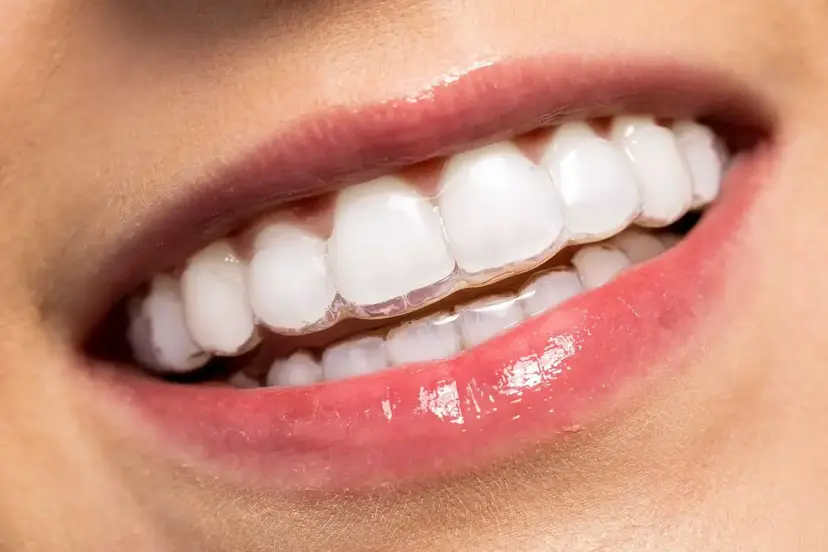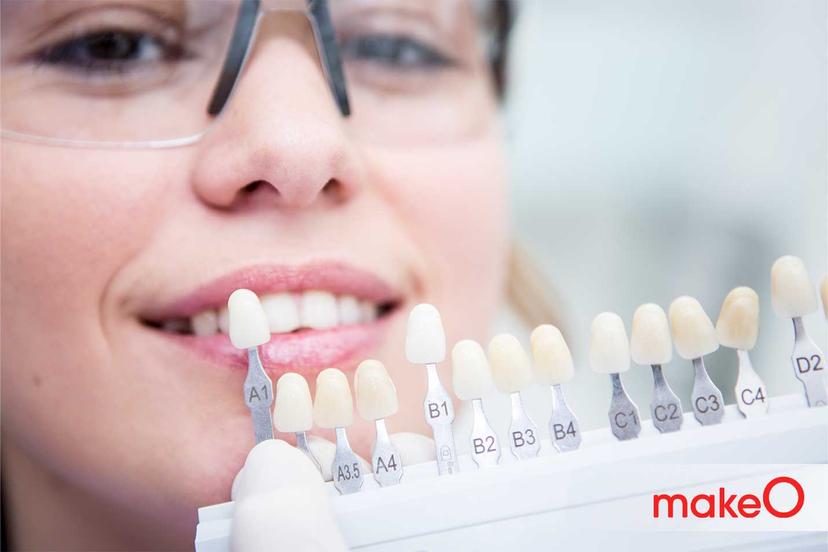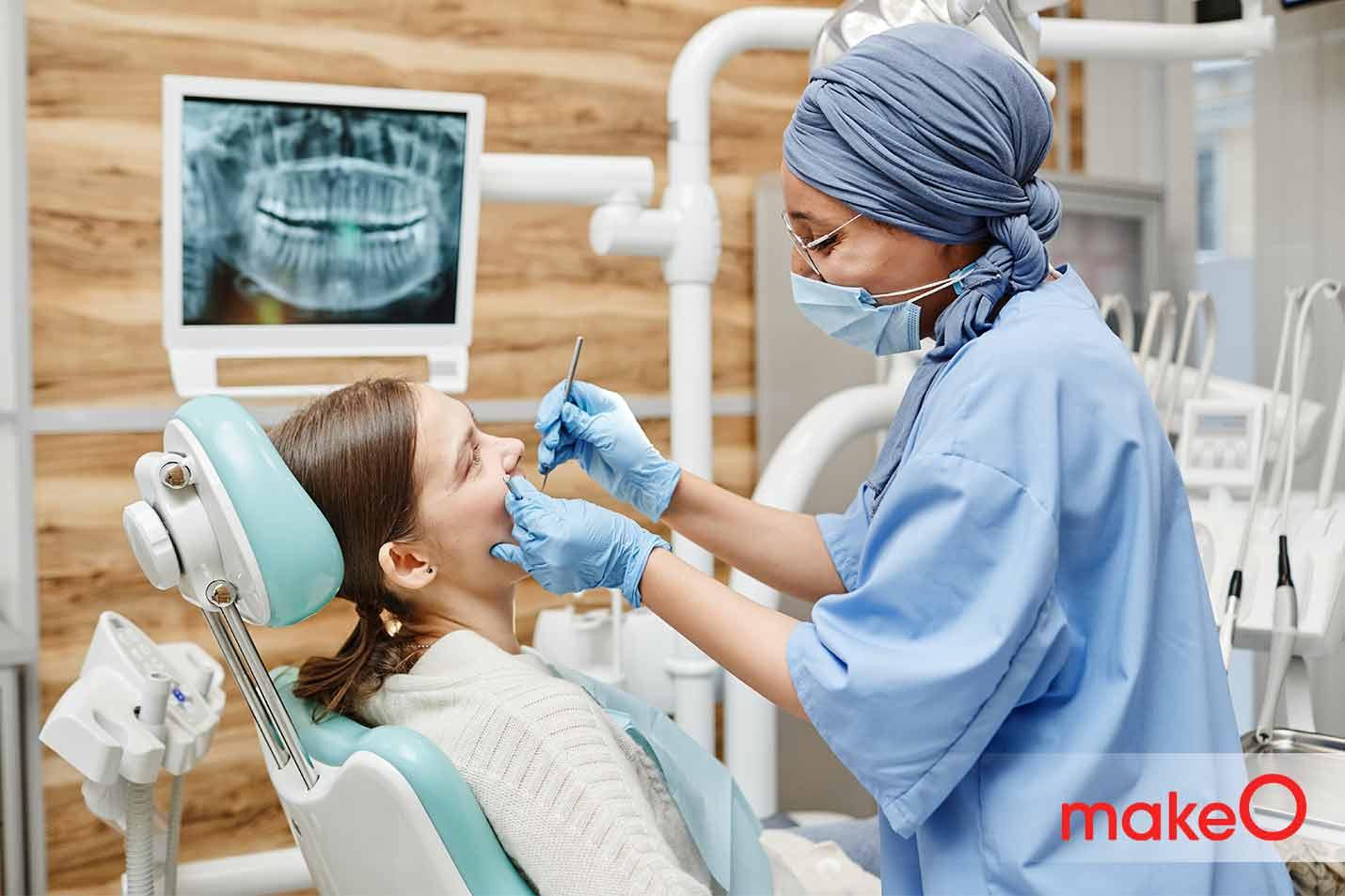MakeO blog
Oral health plays a crucial role in our overall well-being and hence it is important to pay extra attention to our oral health. The gateway to a healthy mouth lies in consistent care and regular dental checkups. These checkups not only keep our pearly whites shining bright but also help in the early detection of dental issues, preventing potential complications in the future. Let us find expert-validated answers to how often you need a dental checkup, what to expect and what you can do to ensure a healthy mouth.
What does a regular dental checkup consist of?
1. Examination
During a regular dental checkup, your dentist will examine your teeth, gums and overall oral cavity for any signs of decay, cavities, gum disease or signs of any other oral health problems.
2. Cleaning
Your dentist might perform professional teeth cleaning to remove plaque and tartar buildup, which regular brushing alone may be inadequate in achieving.
3. X-rays
Dentists may take X-rays to get a comprehensive view of your teeth and jawbone during routine teeth checkups to identify hidden issues like impacted teeth or bone loss.
4. Education
Dentists often provide valuable tips on oral hygiene practices, recommend the right dental products for you and give personalised advice for your specific needs in dental checkups.
Why Do I Need Dental Checkups?
1. Prevention is better than cure
Dental issues caught early are easier and more cost-effective to treat, preventing further complications down the road.
2. Gum disease detection
Gum disease is a prevalent issue that, if left untreated, can lead to tooth loss. Regular checkups help identify and manage gum disease.
3. Oral cancer screening
Dentists are trained to spot early signs of oral cancer, which can be life-saving when detected early.
4. Maintaining good oral hygiene
Regular cleanings ensure that your teeth remain free from plaque and tartar buildup, reducing the risk of cavities and gum disease.
5. Preserving natural teeth
With regular checkups, your dentist can address any decay or damage, helping you keep your natural teeth intact for longer.
How Often Should I Go to the Dentist?
1. Generally, twice a year
Most individuals that do not have any underlying health problems and maintain a consistent oral care routine can benefit from a dental visit every six months for regular checkups and cleanings.
2. Consider your individual oral health needs
Some individuals may require more frequent visits, especially those with a history of dental issues or chronic conditions like diabetes.
3. Age is also a factor
Children and older adults may need more frequent checkups, as they are often more susceptible to dental problems.
4. Depends on your smoking and tobacco use
Smokers and tobacco users have a higher risk of gum disease and oral cancer, necessitating more regular dental visits.
5. Pregnancy needs special attention
Pregnant women should prioritise dental checkups to address any potential oral health issues that may arise during pregnancy.
What Can You Do to Minimise the Need for Dentist Appointments?
While regular dental checkups are essential, you can take certain steps to minimise the number of dental visits needed:
1. Consistent oral hygiene
Make sure to brush your teeth twice a day with a gentle toothbrush and floss every day to prevent the growth of bacteria and remove any stuck food particles in the mouth.
2. Balanced diet
Cut down your intake of sugary drinks and food or foods that can stain your teeth to prevent discolouration and tooth decay.
3. Use mouthwash
Incorporate mouthwash into your oral care routine to control bacteria build-up and keep your breath fresh.
4. Protective gear
If you play sports or engage in activities with a potential impact on your teeth, wear mouthguards to shield your teeth.
5. Quit smoking and tobacco
If you use tobacco, quitting can significantly improve your oral health.
6. Electric Toothbrushes
The innovation of electric toothbrushes has revolutionised the oral care regimen for many. They have soft bristles, smart timers and an excellent oscillation speed that can remove food particles stuck from even the hard-to-reach areas of the mouth. You can check out the Electric Toothbrushes from makeO toothsi that are known to be highly effective and dentist-recommended.
7. Smart Water flosser
Take your Flossing routine up a notch with the Smart Water Flosser from makeO toothsi. It works by targeting a sharp jet stream of water to pass between the teeth and remove any stubborn food particles.
8. Teeth Whitening
You can opt for the Teeth Whitening Kit from makeO toothsi that will not only whiten your teeth for an aesthetic appeal but also improve your overall oral health. It comes with 3 whitening pens, 1 mouth tray, 1 LED light and 1 PVC shade card, making it usable by anyone without any professional help.
Conclusion
Dental checkups are not just about maintaining a dazzling smile; they are essential for overall oral health and general well-being. By attending regular dental checkups, you can catch dental issues early, prevent complications and preserve your natural teeth. Remember to prioritise oral hygiene practices and adopt a healthy lifestyle to minimise the number of visits needed to the dentist. With proper care and attention, you can achieve a beautiful, healthy smile that lasts a lifetime.
FAQs on Dental Checkup
Do you need to visit the dentist every 6 months?
While visiting the dentist every six months is a general recommendation for most individuals, the frequency may vary based on your oral health needs.
How to know if you need a dental filling?
You may need a dental filling if you experience tooth sensitivity, pain when biting or chewing, visible holes or pits in your teeth or if your dentist identifies signs of tooth decay during a checkup.
How much does a regular dental checkup cost in India?
The cost of a regular dental checkup in India can vary depending on factors like location, the dentist's experience, and the specific services included. On average, a basic dental checkup in India may cost around ₹500 to ₹1500.
Can tooth decay develop in 6 months?
Yes, tooth decay can develop within six months, especially if proper oral hygiene is not maintained. Plaque buildup, which contains harmful bacteria, can lead to tooth decay, cavities and gum disease over time if not effectively removed through regular brushing, flossing and dental cleanings.
related categories
Related articles

Types of Braces: Removable vs Fixed Braces, Which is Right For You?

This Diwali, Smile Bright With makeO Teeth Whitening Kit

Dr. Pravin Shetty: Pioneer in Lingual Orthodontics & Innovative Smile Solutions
How do I Know I’m the Right Candidate for makeO toothsi Teeth Aligners?

